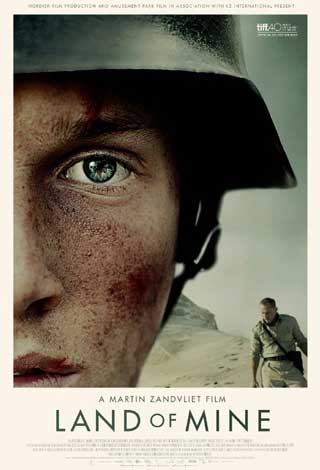“This is my country. Understood? You serve one purpose here.” One of the first lines in the film sets the tone for the moral struggle between retribution and justice in Land of Mine, the Danish nominee for Best Foreign Language film. Set in 1945 after Nazi occupation of Denmark comes to an end, the Danish beaches are strewn with land mines that need clearing. The solution: use German POWs to clear the mines, no matter their experience or age.
We follow a group of fourteen German youths as they are first trained in defusing the mines, and then sent out to begin disposing of some 45,000 land mines. They are under the command of a Danish soldier, Sergeant Rasmussen, a man whose hatred of the Germans is so deep that he deprives them of food to the point where they are too sick to continue working. “If you’re old enough to go to war you’re old enough to clean up you’re mess,” he says. Partly because of Rasmussen’s treatment and partly because of the harrowing danger of their work, slowly the Nazi youths are humanized and the audience begins to feel an element of sympathy for them. Ultimately even Sergeant Rasmussen, despite all his instincts, begins to feel some sympathy himself for the boys, and as the film progresses he starts to try to help them and make sure they remain alive and well so they can go home to Germany when their dangerous work is done.
Director Martin Zandvliet said in a Q&A after the film that much of his inspiration came from the contemporary refugee crisis in Europe, particularly when Denmark closed its borders to refugees from the Middle East and Africa. He echoes this deliberately in the script when he has Rasmussen tell the Nazis to get out of his country. The director acknowledged that historically only a minority of the mine clearers were boys, while most were grown up men. But he said a narrative focused on the plight of the young had significantly more impact – something he said was similar to the “slap in the face” that people felt after seeing images of the drowned three-year-old Syrian refugee on a Turkish beach, which then brought world-wide attention to the refugee crisis. Zandvliet also said he wanted to question the morality of revenge and the practice of an “eye for an eye” after a war is over.

